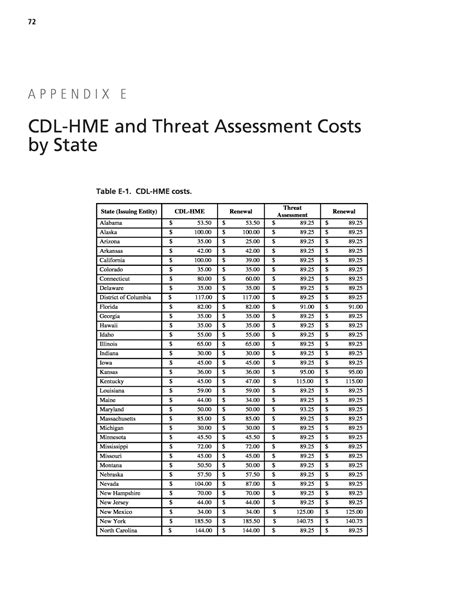CDL Cost: A State-by-State Comparison
The cost of obtaining a Commercial Driver's License (CDL) varies significantly across the United States. Several factors contribute to this disparity, including the state's regulations, the specific CDL endorsements needed, the chosen training method (school vs. self-study), and even the individual's learning pace. This comprehensive guide breaks down the potential costs involved, offering a state-by-state perspective and helping you budget effectively for your CDL journey.
While providing exact figures for every state is impossible due to the variable nature of costs, we will outline the key expense categories and provide a general framework for estimating the total investment.
Understanding the Major Cost Components
Before delving into state-specific nuances, it's crucial to understand the primary cost components contributing to the overall expense of obtaining a CDL:
-
CDL Training: This is often the largest expense. Costs vary dramatically depending on whether you choose a formal CDL training school or opt for self-study. Schools generally provide comprehensive instruction, including classroom learning, behind-the-wheel training, and assistance with the CDL testing process. Self-study requires significant self-discipline and often necessitates paying for individual components like practice tests and materials.
-
Testing Fees: State-administered CDL testing fees cover the written, skills (driving), and potentially additional endorsement tests. These fees vary from state to state.
-
Medical Examination: A Department of Transportation (DOT) physical examination is required to obtain a CDL. The cost of this exam varies depending on your location and the provider.
-
Application Fees: Most states charge a fee for processing your CDL application.
-
Materials and Resources: This encompasses the cost of study materials (books, online courses, practice tests), potential driving practice (if self-studying), and any other miscellaneous expenses.
-
Endorsements: If you need specific endorsements (e.g., Hazmat, Passenger, School Bus), additional testing and training fees will apply.
State-Specific Cost Variations: A General Overview
Providing precise cost breakdowns for each state is beyond the scope of this article due to constantly changing fees and training program costs. However, we can offer some general observations:
-
Higher Cost States: States with higher costs of living often reflect higher training costs. Areas with a strong trucking industry may also have more expensive training programs due to increased demand.
-
Lower Cost States: States with lower costs of living and less competitive training markets may offer more affordable options. Rural areas often have lower training costs compared to urban centers.
-
Regional Differences: Significant cost differences can exist even within a single state. Rural areas typically offer more budget-friendly options than larger metropolitan areas.
Frequently Asked Questions (FAQ)
Here we address some frequently asked questions regarding CDL costs:
<h3>How much does it cost to get a CDL in [Specific State]?</h3>
The cost of obtaining a CDL in a specific state varies greatly depending on the factors mentioned above. To get an accurate estimate for a particular state, it's best to contact local CDL training schools and check the state's Department of Motor Vehicles (DMV) website for testing fees. Remember to factor in all the costs mentioned earlier – training, testing, medical exam, application, and materials.
<h3>What is the cheapest state to get a CDL?</h3>
There's no single "cheapest" state to obtain a CDL. Cost depends on individual circumstances and choices (training school vs. self-study, etc.). Researching training options and fees across different states in your region will help you identify the most cost-effective solution.
<h3>Are there any financial aid options for CDL training?</h3>
Several financial aid options may be available, including grants, loans, and scholarships specifically designed to support CDL training. It's crucial to research programs offered by government agencies, trucking companies, and private organizations.
<h3>Can I get a CDL without going to a training school?</h3>
Yes, it's possible to obtain a CDL through self-study. However, this requires significant dedication, discipline, and access to the necessary resources. While it can potentially save money on training costs, the risk of failing the CDL tests is higher without structured instruction and hands-on experience.
Conclusion
The cost of getting a CDL is a significant investment, but it's one that can pave the way for a rewarding career. Thorough research is essential to understand the various cost components and make informed decisions based on your individual circumstances and financial capabilities. Contacting local CDL training schools and your state's DMV is crucial to obtain accurate and up-to-date cost information for your specific situation. Remember to factor in all expenses and explore potential financial aid options to manage the cost effectively.

